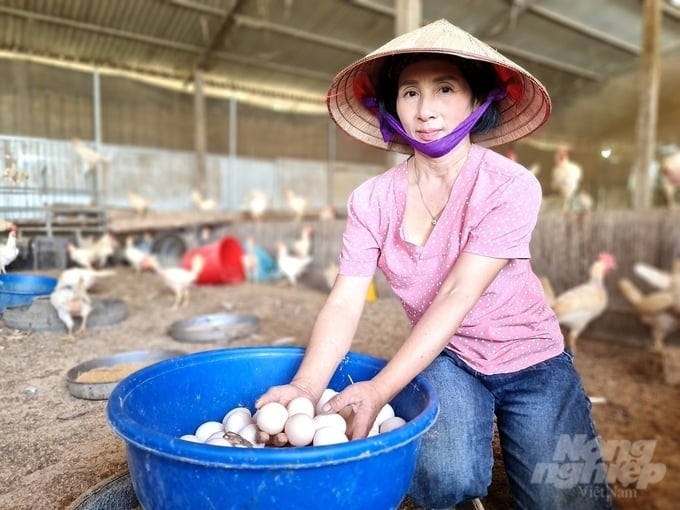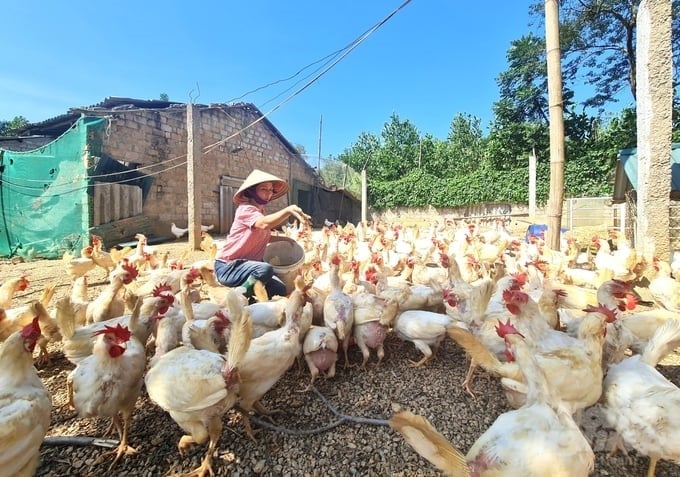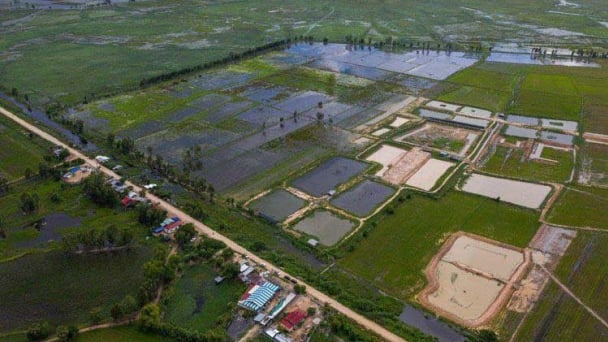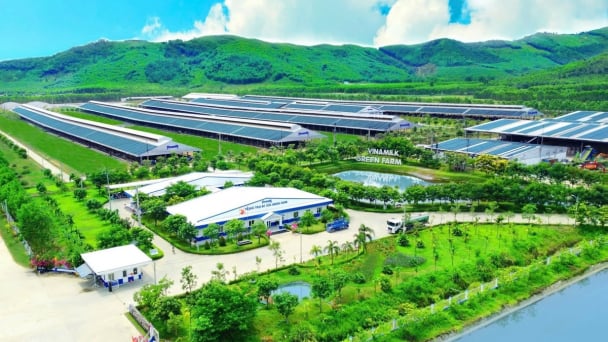May 16, 2025 | 10:44 GMT +7
May 16, 2025 | 10:44 GMT +7
Hotline: 0913.378.918
May 16, 2025 | 10:44 GMT +7
Hotline: 0913.378.918

Preventing diseases for the chicken flock with forest leaves helps Ms. Tham reduce investment costs while still ensuring egg quality. Photo: Dao Thanh.
Currently, the livestock farm of Ms. Nguyen Thi Tham's family in Tan Trao village, Hop Hoa commune, Son Duong district (Tuyen Quang) raises 1,000 chickens of all kinds, including 800 egg-laying chickens, in the form of semi-free range. That means every day, she still releases the chicken flock into the large hill garden for them to have a wide space to exercise.
To prevent her livestock flock from being infected with diseases, she strictly follows the vaccination process against common diseases such as bird flu, Newcastle, Pasteurellosis, etc. In addition, every day she takes leaves in the forest based on the Dao people’s remedies, adds ginger and garlic, and then mixes them with bran to feed chickens to increase their resistance. Therefore, the livestock flock is always healthy, with few diseases.
Ms. Nguyen Thi Tham said that previously, when preventing diseases for the chicken flock with veterinary medicine, she had to spend an average of VND 6 million/month to buy medicine. But preventing diseases with leaves only requires going to the forest to pick medicinal leaves. Another advantage of preventing diseases in chickens with forest leaves is that even if the chickens eat a lot of leaves, their health and egg productivity will not be affected because they act as a vegetable substitute for food.
For about 20 years, livestock farming has helped Ms. Tham's family have a stable source of income and provide her children with a good education. However, in recent years, when the price of animal feed has increased, many disease epidemics have occurred while the purchasing price of commercial cattle and poultry has been low, pushing large-scale livestock households like her family into many difficulties.
Faced with those challenges, Ms. Tham thought that if she continued raising livestock as before, the farmer would hardly make a profit. Therefore, she learned from large-scale livestock farms in the surrounding areas and searched for more information on the internet to process her own animal feed. Ms. Tham said that in order to have bags of bran that are nutritious enough for the livestock flock to grow quickly and healthily, she buys rice, corn, fish, etc., then mixes and composts them to gradually feed.
Many people say that if raising egg-laying chickens without using industrial bran, the chickens will not be able to lay eggs. But she was still determined to do it because she thought that in the past, when there was no industrial bran, chickens still laid eggs very evenly.

From raising egg-laying chickens, Ms. Tham's family earns a profit of more than VND 100 million/year. Photo: Dao Thanh.
That determination helped her succeed. Because compared to farms with conventional farming models, with a chicken number of 1,000 heads/day, it costs more than VND 1 million in industrial bran money, but her family only spent about VND 700,000. Currently, with 800 egg-laying chickens, she collects an average of 400 eggs/day. If the price of eggs in conventional farming models is VND 2,200/egg, chicken eggs from her farm are purchased by supermarkets in Hanoi at a price of VND 3,000/egg.
Thus, livestock farming according to the model of preventing diseases with forest leaves and processing bran with food sources available in the locality that are incubated with probiotics not only helps Ms. Tham reduce input investment costs but also gains a quality egg source to supply to the market. These eggs are received at quite high prices. Deducting all expenses from raising egg-laying chickens, Ms. Tham's family earns a profit of more than VND 100 million/year.
Mr. Nguyen Van Loi, Chairman of the People's Committee of Hop Hoa commune, Son Duong district, said that Ms. Nguyen Thi Tham's family's model of raising egg-laying chickens is a prominent and typical livestock model of the locality.
The locality encourages the development of household farming, especially large-scale farming, in the direction of disease safety and friendliness to the environment. The commune always creates favorable conditions for households to access preferential loan capital for investment in production and business.
The commune also encourages and creates conditions to guide and help Ms. Tham's family complete the procedures so that the family's livestock products can soon be certified with OCOP stars.
Translated by Huyen Vu Thu

(VAN) Vietnam’s TH Group officially put its high-tech fresh milk processing plant into operation in the Russian Federation, marking a historic moment as the first TH true MILK cartons were produced in Russia.

(VAN) Use of high-quality broodstock and biotechnology is regarded as the most effective approach to ensuring sustainable and economically viable shrimp aquaculture ahead of climate change and the emergence of increasingly intricate disease patterns.

(VAN) Carbon farming is a form of agricultural practices that helps absorb more greenhouse gases than it emits, through smart management of soil, crops, and livestock.

(VAN) This is a key content of the Memorandum of Understanding recently signed between the Vietnam Fisheries Society and Kunihiro Inc of Japan.

(VAN) To achieve the goal, local authorities and businesses in Kon Tum province have fully prepared the necessary conditions for the new Ngoc Linh ginseng planting season.

(VAN) Jiangsu province is gearing up to host training programs in Phnom Penh, the capital of Cambodia, this year to establish the Fish and Rice Corridor.

(VAN) Le Hoang Minh, representing Vinamilk, shared the company's experience in energy saving and green energy transition for production at a workshop held during the P4G Summit.